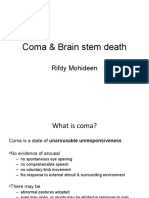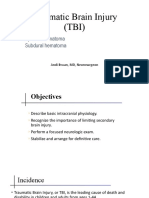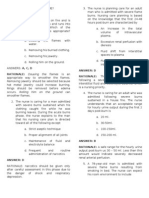GCS Assessment Aid Bahasa
GCS Assessment Aid Bahasa
Uploaded by
Merry AndrianyCopyright:
Available Formats
GCS Assessment Aid Bahasa
GCS Assessment Aid Bahasa
Uploaded by
Merry AndrianyOriginal Title
Copyright
Available Formats
Share this document
Did you find this document useful?
Is this content inappropriate?
Copyright:
Available Formats
GCS Assessment Aid Bahasa
GCS Assessment Aid Bahasa
Uploaded by
Merry AndrianyCopyright:
Available Formats
Coma Definition
Spectrum of Altered Level of Consciousness & Responsiveness
– Severe: Coma
– Moderate: Obtundation / stupor
– Mild: Lethargy / somnolence
Clinical circumstances
– Trauma
– CVA / brain hemorrhage
– End-stage dementia / degenerative brain diseases
– Severe metabolic/physiologic disturbances (e.g., anoxia, hypothermia,
diabetes, severe electrolyte imbalance, many others)
– Organ failure (e.g. hepatic or uremic coma)
– Encephalitis/meningitis
– Medications, drugs and toxins
© 2016 HCQ Consulting
Glasgow Coma Scale (GCS)
Objective measure of consciousness and responsiveness
Prognostic significance in trauma only
Valid objective measure in all circumstances
Total score 3 to 15
– Eye opening: 1 to 4
– Verbal response: 1 to 5
– Motor response: 1 to 6
Diagnostic correlation:
– Total score 3-8: Coma
– Total score 9-12: Obtundation/stupor
– Total score 13-14: Lethargy / somnolence
© 2016 HCQ Consulting
Glasgow Coma Scale (GCS)
Spontaneous 4
Eye Verbal Command 3
Opening To pain 2 MCC
None 1 MCC
Oriented 5
Confused but answers questions 4
Verbal Inappropriate, words discernible 3
Incomprehensible speech 2 MCC
None 1 MCC
Obeys commands 6
Purposeful movement to pain 5
Withdraws (reflexive) from pain 4
Motor
Abnormal (spastic) flexion 3
Extensor (rigid) response 2 MCC
None 1 MCC
© 2016 HCQ Consulting
Coding Guidelines
Documentation
– Coma
– Unconsciousness
– Persistent vegetative state
GCS
Excludes 1 Note
Official Coding Guidelines
© 2016 HCQ Consulting
Coding Guidelines
Coma (MCC) requires diagnosis by provider
– Unconsciousness coded as coma
• Must be prolonged
• Not transient like seizure or concussion
– Persistent vegetative state coded as a CC: query for coma
GCS
– No requirement for documentation of “coma”
• But need something that makes the GCS pertinent (e.g., altered mental status)
– Code from scoring sheet by any healthcare professional
• Examples: nurse, pre-hospital EMS
– Use lowest score obtained
– Do not code total score if components coded
– Lowest 2 scores of each component are MCCs
© 2016 HCQ Consulting
Coding Guidelines
Excludes 1 note for R40-R46 which includes coma and GCS when
they are part of a pattern of a mental disorder (F01-F99).
• Psych conditions, dementia, intellectual disability, as well as
alcohol and drug use, abuse, dependence, intoxication, etc.
• Not excluded in these conditions when due to something else
• Not excluded from poisoning, adverse effect or toxic effect
• Not excluded from conditions other than F01-F99 such as
severe metabolic and physiologic disturbances or infections like
encephalitis/meningitis
© 2016 HCQ Consulting
Official Coding Guidelines
Section I.C.18.e: “The coma scale codes (R40.2-) can be used in
conjunction with traumatic brain injury codes, acute
cerebrovascular disease or sequelae of cerebrovascular disease
codes. These codes are primarily for use by trauma registries, but
they may be used in any setting where this information is
collected. The coma scale codes should be sequenced after the
diagnosis code(s)”
Does not prohibit use in other situations such as:
– Drug overdose
– Severe electrolyte imbalance
– Encephalitis
Remember Excludes 1 note for mental disorders
© 2016 HCQ Consulting
Hepatic Encephalopathy
ICD-10 assigns to hepatic failure with or without coma
5 pairs of codes:
– NOS
– Alcoholic
– Due to drugs
– Acute/subacute
– Chronic
With coma is MCC
– Appears to require a diagnosis of coma or unconsciousness?
– Other significant manifestations seem to be excluded from “with coma”?
• Agitation, disorientation, confusion, asterixis
ICD-10 changes to include hepatic encephalopathy without coma
are being considered
© 2016 HCQ Consulting
Physician Education
Encourage awareness
Stress importance of GCS
Establish organizational process for recording GCS in
record of all patients with altered level of consciousness
ACDIS commercial educational tool:
CDI for the Clinician™
© 2016 HCQ Consulting
You might also like
- Psychiatry Study Guide For ShelfDocument42 pagesPsychiatry Study Guide For Shelfappolinia67% (15)
- Muscle Coloring BookDocument9 pagesMuscle Coloring Bookjeaves14100% (1)
- Edheads Trauma WorksheetDocument3 pagesEdheads Trauma WorksheetWolflover ZodiacNo ratings yet
- Neuro AssessmentDocument13 pagesNeuro AssessmentOrlea Francisco-Sisio100% (2)
- Rock BurstDocument2 pagesRock BurstIzhar Jiskani100% (1)
- Ao Foundation - Handouts - English - Principles of Fracture Fixation - Handout - v2Document12 pagesAo Foundation - Handouts - English - Principles of Fracture Fixation - Handout - v2raz2000No ratings yet
- 2008 AnswersDocument16 pages2008 AnswersSoumabho DasNo ratings yet
- Head InjuryDocument11 pagesHead InjurySonam RawatNo ratings yet
- ApproachtocomaDocument65 pagesApproachtocomantnquynhproNo ratings yet
- Reviewed and The Treatment Is Begun in A Timely FashionDocument22 pagesReviewed and The Treatment Is Begun in A Timely FashionRavish MalhotraNo ratings yet
- MP422 Management of CNS Conditions DR Trevor Bushell X2856Document20 pagesMP422 Management of CNS Conditions DR Trevor Bushell X2856Tebah AlatwanNo ratings yet
- Coma & Brain Stem DeathDocument24 pagesComa & Brain Stem DeathSunn Ren TeeNo ratings yet
- Enls 5.0 Protocol - TbiDocument32 pagesEnls 5.0 Protocol - TbiJoseNo ratings yet
- Driving and Medical ConditionDocument28 pagesDriving and Medical Conditionنزار الحرازيNo ratings yet
- Psychiatry Case 3 f3Document23 pagesPsychiatry Case 3 f3adammohammedjamal328No ratings yet
- Concussion To Consequence - Managing Sport-Related Concussion On & Off The FieldDocument63 pagesConcussion To Consequence - Managing Sport-Related Concussion On & Off The FieldSNo ratings yet
- Psychiatry Answered Qs Till 2021 V2 - 241022 - 101931Document57 pagesPsychiatry Answered Qs Till 2021 V2 - 241022 - 101931mohieydinNo ratings yet
- Neurologic Emergencies Michael J. Caudell, M.D., FACEPDocument10 pagesNeurologic Emergencies Michael J. Caudell, M.D., FACEPBiswaranjan PadhyNo ratings yet
- Neurologic Emergencies Michael J. Caudell, M.D., FACEPDocument10 pagesNeurologic Emergencies Michael J. Caudell, M.D., FACEPgerontogeriaNo ratings yet
- Lecturer of Neurology Mansoura Faculty of Medicine: Ashraf El-Mitwalli, MDDocument122 pagesLecturer of Neurology Mansoura Faculty of Medicine: Ashraf El-Mitwalli, MDCarolina TulanNo ratings yet
- Head injuries - Student PPTDocument11 pagesHead injuries - Student PPTNguyênNo ratings yet
- Multiple Sclerosis 2023-2024Document34 pagesMultiple Sclerosis 2023-2024Lamis AlianNo ratings yet
- Department of General Practice - Family MedicineDocument122 pagesDepartment of General Practice - Family Medicinesteven hkNo ratings yet
- Dementia: Dr. Sharlene Alick OrtizDocument32 pagesDementia: Dr. Sharlene Alick OrtizShary AlickNo ratings yet
- Neuro Trauma: Nathan Mcsorley Speciality Trainee Neurosurgery 23B Ninewells HospitalDocument35 pagesNeuro Trauma: Nathan Mcsorley Speciality Trainee Neurosurgery 23B Ninewells HospitalnathanNo ratings yet
- Emerg Med Clin NA 2015 Aug 33 (3) 691Document22 pagesEmerg Med Clin NA 2015 Aug 33 (3) 691Xavier AbrilNo ratings yet
- Approach to a child with Altered level ofDocument19 pagesApproach to a child with Altered level ofjoomds51No ratings yet
- Neurological assessmentDocument24 pagesNeurological assessmentAliollieNo ratings yet
- Clinical Practice Guidelines For Mild TraumaticDocument11 pagesClinical Practice Guidelines For Mild TraumaticAlejandro GueudetNo ratings yet
- Medicine 2e Sample PagesDocument18 pagesMedicine 2e Sample PagesScholastica ChinazoNo ratings yet
- Brooks 2015Document13 pagesBrooks 2015Anil Hakim SyofraNo ratings yet
- CNS - Mood Disorders (2022-2023)Document42 pagesCNS - Mood Disorders (2022-2023)aymanNo ratings yet
- Coma Means Dysfunction of Either TheDocument28 pagesComa Means Dysfunction of Either ThedrravikchNo ratings yet
- Rapidly Progressive Dementias & DeliriumDocument82 pagesRapidly Progressive Dementias & DeliriumBobby VarkeyNo ratings yet
- Seizure disordersDocument9 pagesSeizure disordersghadah.e181419No ratings yet
- 1 s2.0 S0303846713005180 mmc2Document3 pages1 s2.0 S0303846713005180 mmc2Margareth HildariaNo ratings yet
- (JOURNAL) What Is Neuroleptic Malignant SyndromeDocument3 pages(JOURNAL) What Is Neuroleptic Malignant SyndromeAndi Rizki TenryayuNo ratings yet
- A. D. TBI, Rehabilitation of Traumatic Brain InjuryDocument68 pagesA. D. TBI, Rehabilitation of Traumatic Brain InjuryRupali Raut100% (1)
- Cidera KepalaDocument180 pagesCidera KepalaDian NataliaNo ratings yet
- 1B-OSCE_KSMC_CVTDocument6 pages1B-OSCE_KSMC_CVTمركز نبض عدن الطبيNo ratings yet
- Epilepsy - LDocument66 pagesEpilepsy - LHaymanot AnimutNo ratings yet
- Neurological AssessmentDocument64 pagesNeurological AssessmentNEuRoLoGisT CoFFeeCuP95% (20)
- Approach To Patient With Altered Mental Status & ComaDocument38 pagesApproach To Patient With Altered Mental Status & ComaSol Gat ChupataNo ratings yet
- Fundamental of Nursing IIDocument42 pagesFundamental of Nursing IIkezstacey61No ratings yet
- Multiple SclerosisDocument19 pagesMultiple SclerosisIna FuentesNo ratings yet
- CiDocument6 pagesCiVaruna sharmaNo ratings yet
- Glasgow Coma Scale AssesmentDocument18 pagesGlasgow Coma Scale AssesmentnerskittaholisticcareNo ratings yet
- Trauma and Brain InjuryDocument48 pagesTrauma and Brain Injurya20-0353-958No ratings yet
- Learning Contract EndocrinologyDocument6 pagesLearning Contract EndocrinologyGerald AndersonNo ratings yet
- High Risk Mild Head InjuryDocument1 pageHigh Risk Mild Head InjuryMay JPNo ratings yet
- Geriatrics 2023 FinalDocument119 pagesGeriatrics 2023 FinalBelinda ELISHA100% (1)
- Delirium in Critically IllDocument37 pagesDelirium in Critically IllSanj.etcNo ratings yet
- B2B Psychopharmacology 2015Document128 pagesB2B Psychopharmacology 2015Soleil DaddouNo ratings yet
- Traumatic Brain Injury (TBI) : Epidural Hematoma Subdural HematomaDocument62 pagesTraumatic Brain Injury (TBI) : Epidural Hematoma Subdural HematomaRey AlwiwikhNo ratings yet
- Case Presentation: DR MakaiDocument24 pagesCase Presentation: DR MakaiKing MazingaNo ratings yet
- Craniocerebral Traumatology TBIDocument22 pagesCraniocerebral Traumatology TBIconfuisosNo ratings yet
- Acute Confusion, How To Nurse, 05Document6 pagesAcute Confusion, How To Nurse, 05DouglasNo ratings yet
- Unit 4 Knowledge Check 3Document96 pagesUnit 4 Knowledge Check 3SH SNo ratings yet
- Neuro AssessmentDocument13 pagesNeuro Assessmentyassyrn100% (2)
- Delirium, (Confusional State) A Simple Guide To The Condition, Diagnosis, Treatment And Related ConditionsFrom EverandDelirium, (Confusional State) A Simple Guide To The Condition, Diagnosis, Treatment And Related ConditionsNo ratings yet
- Fast Facts: Optimización del tratamiento de las fluctuaciones motoras en la enfermedad de Parkinson: Adaptando el tratamiento al pacienteFrom EverandFast Facts: Optimización del tratamiento de las fluctuaciones motoras en la enfermedad de Parkinson: Adaptando el tratamiento al pacienteNo ratings yet
- A Simple Guide to Pick Disease, Diagnosis, Treatment and Related ConditionsFrom EverandA Simple Guide to Pick Disease, Diagnosis, Treatment and Related ConditionsRating: 5 out of 5 stars5/5 (2)
- A Simple Guide to Concussion, Diagnosis, Treatment and Related ConditionsFrom EverandA Simple Guide to Concussion, Diagnosis, Treatment and Related ConditionsNo ratings yet
- Endodontic EmmergenciesDocument27 pagesEndodontic EmmergenciesJitender Reddy100% (2)
- Neurological DisordersDocument20 pagesNeurological DisordersEdil M JamaNo ratings yet
- SC4000 Forklift ManualDocument16 pagesSC4000 Forklift ManualpetromechanicsnjNo ratings yet
- Arm AnatomyDocument66 pagesArm AnatomyManaila AdrianNo ratings yet
- MEGADETHDocument5 pagesMEGADETHttibia77No ratings yet
- Cooper Tools DrillingDocument150 pagesCooper Tools DrillingKiran Kumar K TNo ratings yet
- Personal Protective Equipment & Maintenance SafetyDocument52 pagesPersonal Protective Equipment & Maintenance SafetyAl-ajim HadjiliNo ratings yet
- WT7800CWDocument52 pagesWT7800CWcomunidelNo ratings yet
- Operative Surgery and Topographic AnatomyDocument98 pagesOperative Surgery and Topographic AnatomyVkcegcaNo ratings yet
- Trauma Radiography EditdDocument107 pagesTrauma Radiography Editdjustinjose08100% (2)
- 2003 - G.R. No. 145804, (2003-02-06)Document6 pages2003 - G.R. No. 145804, (2003-02-06)ArahbellsNo ratings yet
- PNR v. BruntyDocument2 pagesPNR v. BruntyNath AntonioNo ratings yet
- DC Arc FlashDocument11 pagesDC Arc Flashgerrzen64No ratings yet
- Anatomy & Physiology The Muscular System Flashcards - QuizletDocument5 pagesAnatomy & Physiology The Muscular System Flashcards - Quizletmalenya1No ratings yet
- Law of Tort AssignmentDocument11 pagesLaw of Tort AssignmentChabala ChibeloNo ratings yet
- JointsDocument4 pagesJointsotaibynaifNo ratings yet
- 6 Man From Level IV ManualDocument38 pages6 Man From Level IV ManualJacques GiardNo ratings yet
- Are You Kidding MeDocument10 pagesAre You Kidding MeChelsea RoseNo ratings yet
- San Diego vs. MD Transit and Taxi CoDocument1 pageSan Diego vs. MD Transit and Taxi CoPam VillaseñorNo ratings yet
- Ortho Review 1Document67 pagesOrtho Review 1mark tNo ratings yet
- Fracture Treatment ProtocolsDocument14 pagesFracture Treatment ProtocolsZikrul IdyaNo ratings yet
- Focus On Diagnosis of Acute Compartment Syndrome PDFDocument8 pagesFocus On Diagnosis of Acute Compartment Syndrome PDFMuthia DewiNo ratings yet
- Guidelines On The Management of Massive Blood Loss: GuidelineDocument8 pagesGuidelines On The Management of Massive Blood Loss: GuidelineRatna AgustinaNo ratings yet
- "Feel This" (Feat. Enation)Document10 pages"Feel This" (Feat. Enation)Caterina De LucaNo ratings yet
- Attempted v. Frustrated FelonyDocument25 pagesAttempted v. Frustrated Felony'mhariie-mhAriie TOotNo ratings yet
- Stress CorrosionDocument13 pagesStress CorrosionAbhinav Gupta0% (1)

























































































